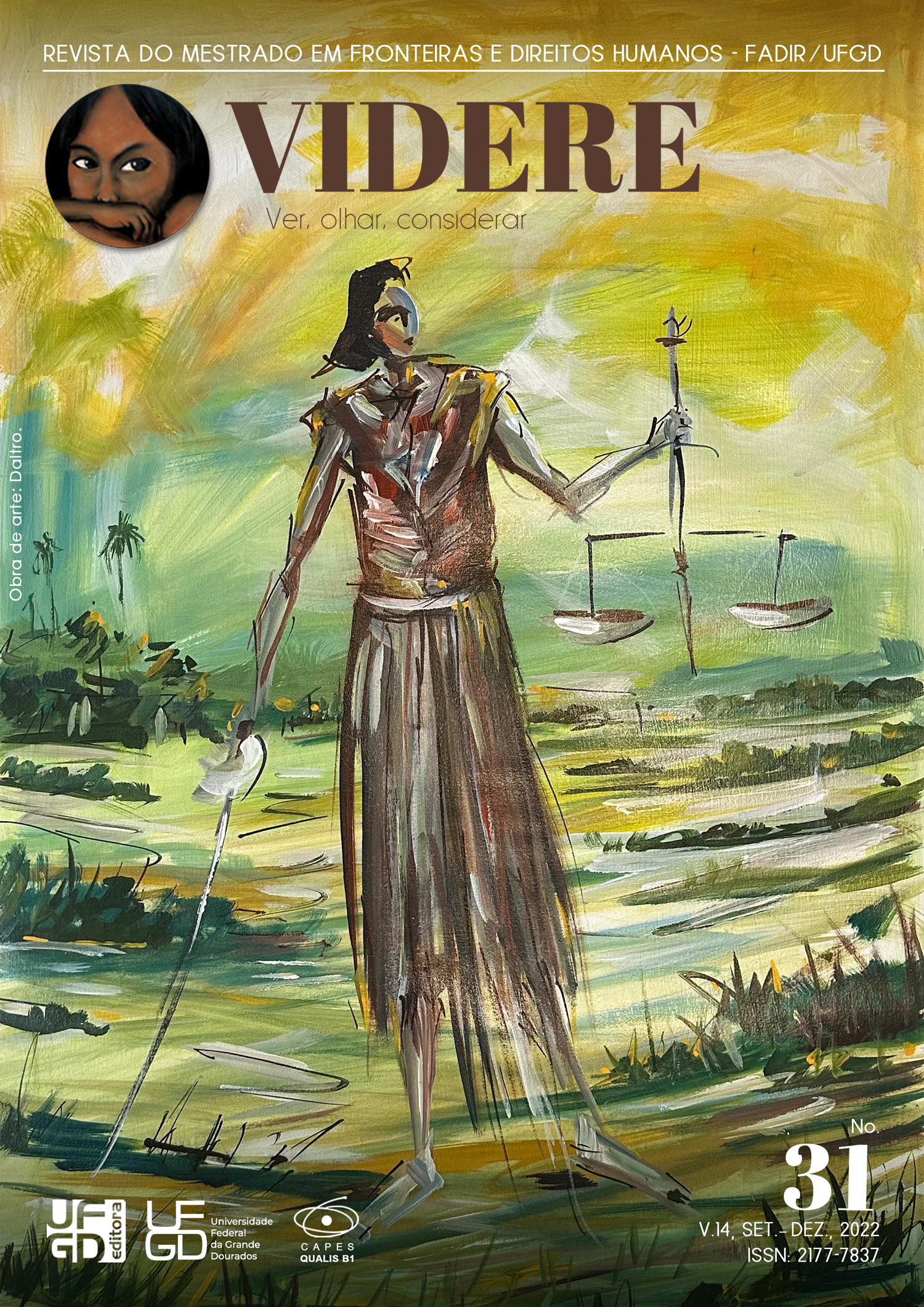THE SUSTAINABILITY AS A TOOL TO PROTECT PERSONALITY RIGHTS IN CIVIL REGISTRY OFFICES OF INDIVIDUALS
DOI:
https://doi.org/10.30612/videre.v14i31.16321Keywords:
Sustainability. Personality rights. Registry offices.Abstract
This article have the premise that sustainability is an essential tool for the achievement of human rights. Through the deductive method, based on doctrinal and normative analyses, the text will seek and answer, in detail, the following problem question: what would be the possible relationships between sustainability, personality rights and the Civil Registry of Natural Persons (RCPN)? The main objective is to identify how sustainability has been used as a tool for the protection and realization of personality rights such as the right to a name, the right to gender identity, among other essential prerogatives for the exercise of citizenship. To achieve this objective, the text is divided into three parts. Initially, the correlation between personality rights and citizenship will be worked out. Next, it is intended to expose the relevance of the activity performed by the RCPN registry offices in the institutions and people´s lives. Finally, the main arguments that elucidate the importance of sustainability as a tool for the protection of personality rights in RCPN registries will be presented.
Downloads
References
ARENDT, Hannah. Origens do totalitarismo. São Paulo: Cia. Das Letras, 1989.
BOBBIO, Norberto. O futuro da democracia: uma defesa das regras do jogo. Rio de Janeiro: Paz e terra, 1986.
BRASIL. Constituição da República Federativa do Brasild e 1988. In: Diário Oficial da República Federativa do Brasil. Brasília, DF, 05.out.1988. Disponível em: http://www.planalto.gov.br/ccivil_03/Constituicao/Constituiçao.htm . Acesso em: 11.jul.2022.
BRASIL. Lei n. 6.015, de 31 de dezembro de 1973. Dispõe sobre os registros públicos, e dá outras providências. In: Diário Oficial da República Federativa do Brasil. Brasília, DF, 31 dez. 1973, retificado em 30 out 1975. Disponível em: http://www.planalto.gov.br/ccivil_03/leis/l6015compilada.htm Acesso em: 11.jul.2022.
BRASIL. Lei n. 8.935, de 18 de novembro de 1994. Regulamenta o art. 236 da Constituição Federal, dispondo sobre serviços notariais e de registro. (Lei dos cartórios). In: Diário Oficial da República Federativa do Brasil. Brasília, DF, 21 nov. 1994. Disponível em: http://www.planalto.gov.br/ccivil_03/leis/l8935.htm Acesso em: 11.jul.2022.
BULZICO, Bettina Augusta Amorim. O Direito Internacional Ambiental e o Direito ao Meio Ambiente Ecologicamente Equilibrado. Dissertação de Mestrado. UniBrasil, 2009.
DALLEDONE, Rodrigo Fernandes de Lima. O regime jurídico da função pública notarial e sua fiscalização pelo Poder Judiciário. 2012. Dissertação apresentada no Mestrado em Direito da Universidade Federal do Paraná, Curitiba, 2012.
INSTITUTO BRASILEIRO DE GEOGRAFIA E ESTATÍSTICA. Panorama. Disponível em: https://cidades.ibge.gov.br/brasil/panorama Acesso em: 11.jul.2022
RODRIGUES, Felipe Leonardo; FERREIRA, Paulo Roberto Gaiger. Tabelionato de notas. In: CASSETARI, Christiano. Coleção Cartórios. São Paulo: Saraiva Jur, 2016.
SOUZA, Aline Darcy Flôr de. Gratuidade da certidão de nascimento e seus reflexos na atividade registral. In: Revista dos Tribunais. São Paulo. v. 970, ago. 2016. Disponível em: http://www.mpsp.mp.br/portal/page/portal/documentacao_e_divulgacao/doc_biblioteca/bibli_servicos_produtos/bibli_boletim/bibli_bol_2006/RTrib_n.970.12.PDF Acesso em: 11.jul.2022.
SZANIAWSKI, Elimar. Direitos da personalidade e sua tutela. 2. ed. São Paulo: Revista dos Tribunais, 2005.
Downloads
Published
How to Cite
Issue
Section
License
Copyright (c) 2023 Revista Videre

This work is licensed under a Creative Commons Attribution-NonCommercial-ShareAlike 3.0 Unported License.
Authors must accept the publication rules when submitting the journal, as well as agree to the following terms:
(a) The Editorial Board reserves the right to make changes to the Portuguese language in the originals to maintain the cultured standard of the language, while respecting the style of the authors.
(b) Authors retain the copyright and grant the journal the right to first publication, with the work simultaneously licensed under the Attribution-NonCommercial-ShareAlike 3.0 Brazil (CC BY-NC-SA 3.0 BR) that allows: Share - copy and redistribute the material in any medium or format and Adapt - remix, transform, and create from the material. CC BY-NC-SA 3.0 BR considers the following terms:
- Attribution - You must give the appropriate credit, provide a link to the license and indicate whether changes have been made. You must do so under any reasonable circumstances, but in no way that would suggest that the licensor supports you or your use.
- NonCommercial - You may not use the material for commercial purposes.
- Sharing - If you remix, transform, or create from material, you must distribute your contributions under the same license as the original.
- No additional restrictions - You may not apply legal terms or technological measures that legally restrict others from doing anything that the license permits.
(c) After publication, authors are allowed and encouraged to publish and distribute their work online - in institutional repositories, personal page, social network or other scientific dissemination sites, as long as the publication is not for commercial purposes.



















